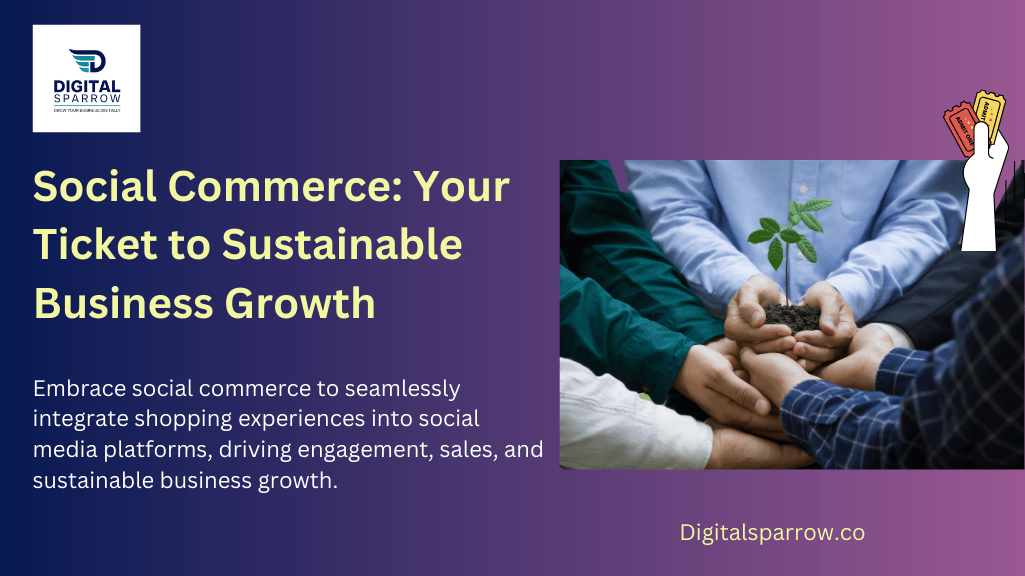Social commerce refers to a business model which focuses on combining social media with e-commerce. It helps in enabling transactions and social interactions between businesses and customers. This includes selling goods and services by the means of social media platforms like Instagram, Facebook, Twitter, Pinterest, WhatsApp and others.
Social media features such as likes, views, comments, shares, collaborations and giveaways are used by businesses in order to sell as well as promote products and services to customers. Not only this, social commerce uses other e-commerce features like the use of catalogues, shopping carts and direct payment gateways into the desired social media platforms. This helps in making the purchase experience of the customer smooth and hassle-free directly from social media only.
Social commerce aims in utilising the power of social media and creates a more smooth and more personalised shopping experience for customers. This helps in increasing customer loyalty and improving brand awareness of the business, which ultimately leads to more revenue generation. As social media has become widely popular in recent years, businesses turn to social media in order to take inspiration as well as a recommendation from users. This helps the business in creating those products and services that are more customer-oriented and can become a hit when launched in the market. Social commerce has helped businesses in reaching and engaging with customers in ways which weren’t possible earlier.
B2B marketing-https://digitalsparrow.co/humanizing-b2b-marketing-building-authentic-connections/
Social commerce can be very effective for a business that wants to compete in the present world that is ruled by social media. Here are some advantages of social commerce:
- Increased reach: As in the 21st century, life without the internet can’t be imagined. And with so much influence of social media, almost every person has access to the internet and a smartphone. So, millions of users are active on social media on a daily basis, which is proving to be efficient for businesses in order to reach a wide audience. This helps in reaching out to potential customers which ultimately increases the revenue of the business.
- Personalization: With millions of users active on social media on a daily basis, businesses can collect data and information regarding customers’ preferences and buying habits. Their interests can be optimised which is later used in order to create products and services that are in accordance with the data. More personalisation helps in increasing brand awareness and customer loyalty towards the brand.
- Improved engagement: As millions of users are active on social media, businesses can engage with customers in no time. The businesses can ask customers questions related to their products or services, conduct surveys to find ways to improve, and ask for feedback. The increase in interaction with customers will help the business in increasing engagement on their social media profile, increase brand awareness and develop feelings of loyalty among customers.
- Trust-building: As with the help of social media, users have now become smarter and have developed a perspective about the brands they follow. But in order to improve the trust of customers, businesses can engage with customers by replying to their comments, solving their queries and providing proof with help of clients’ reviews and testimonials. This will help the business in building trust among its customers, which eventually will improve sales and increase revenue.
- Increased Sales: Earlier it was hard for businesses to interact with customers directly. But with social media, businesses can now direct conversations with both existing and potential customers. The business can interact and develop personalized products and services for its customers, customize marketing strategies according to the data collected, and target its potential customers. This will help the business in increasing its sales and improve conversion rates.
- Cost Effective: In a traditional e-commerce website, the cost of setting up is high as compared to setting up a social media profile where the cost is equal to zero. You just need to sign up, make a business profile, fill up the information and you are ready to go. The business after setting up its business profile can start interacting with the customers, update them with new products and services, and start the sale of goods and services online. Social media can help businesses in reducing the extra cost and give a better return on investment.

Social commerce has a big potential to support long-term business success. The ability of a business to grow and expand while balancing economic, environmental, and social issues is referred to as sustainable business growth. The following ways social commerce can support long-term business growth:
- Encourages responsible consumption: Social commerce platforms can encourage ethical consumption by disseminating details about a product’s environmental impact, ethical sourcing, and production procedures. Customers may benefit from this and support businesses that prioritise sustainability by making educated selections.
- Supporting local and small businesses: By giving them a platform to sell their items online, social commerce platforms can assist in supporting local and small businesses. This can boost regional economies and lessen the environmental impact of long-distance shipping.
- Reducing environmental impact: As with social media, the need for traditional stores has reduced, and social commerce helps businesses in reducing environmental impact. Also, with the sale of goods and services online, businesses can contribute to reducing wastage, energy consumption as well as pollution.
- Making use of social media for marketing: Social commerce platforms can make use of social media for marketing, which in turn saves marketing expenses and boost client involvement. This helps in improving sales, customer loyalty, and customer experience and can contribute to long-term business expansion of the business.
Effective marketing techniques-https://startupadvice.in/increasing-the-growth-of-small-business-through-effective-marketing-techniques/
- Promoting consumer engagement: By establishing a two-way conversation between businesses and customers, social commerce platforms help businesses in promoting customer engagement. By having a greater understanding of the wants and needs of the clients, businesses can benefit by being able to make decisions that strike a balance between economic, environmental, and social factors.
Therefore, social commerce can help in the expansion of sustainable enterprises by reducing negative environmental effects, aiding small and local firms, promoting responsible consumption, increasing consumer involvement, and utilising social media for promoting their goods and services. Businesses can achieve sustainable growth and contribute to a positive impact on a more sustainable future for generations to come by means of balancing economic, environmental, and social factors.


Your article helped me a lot, is there any more related content? Thanks! https://www.binance.com/ru-UA/register?ref=OMM3XK51